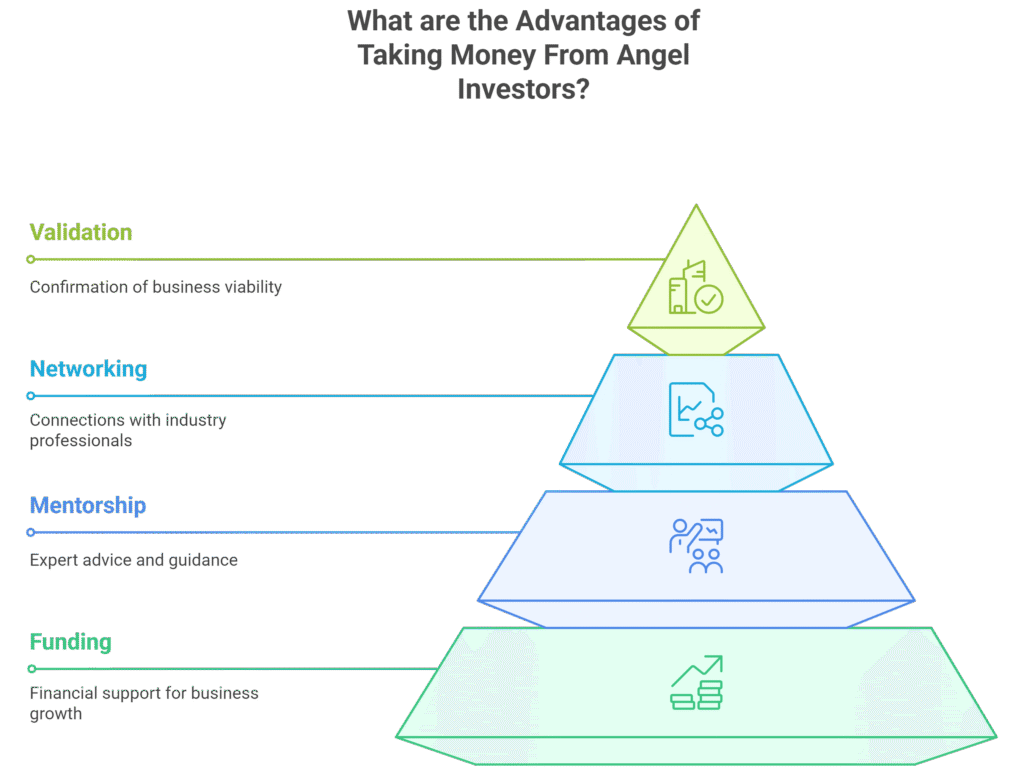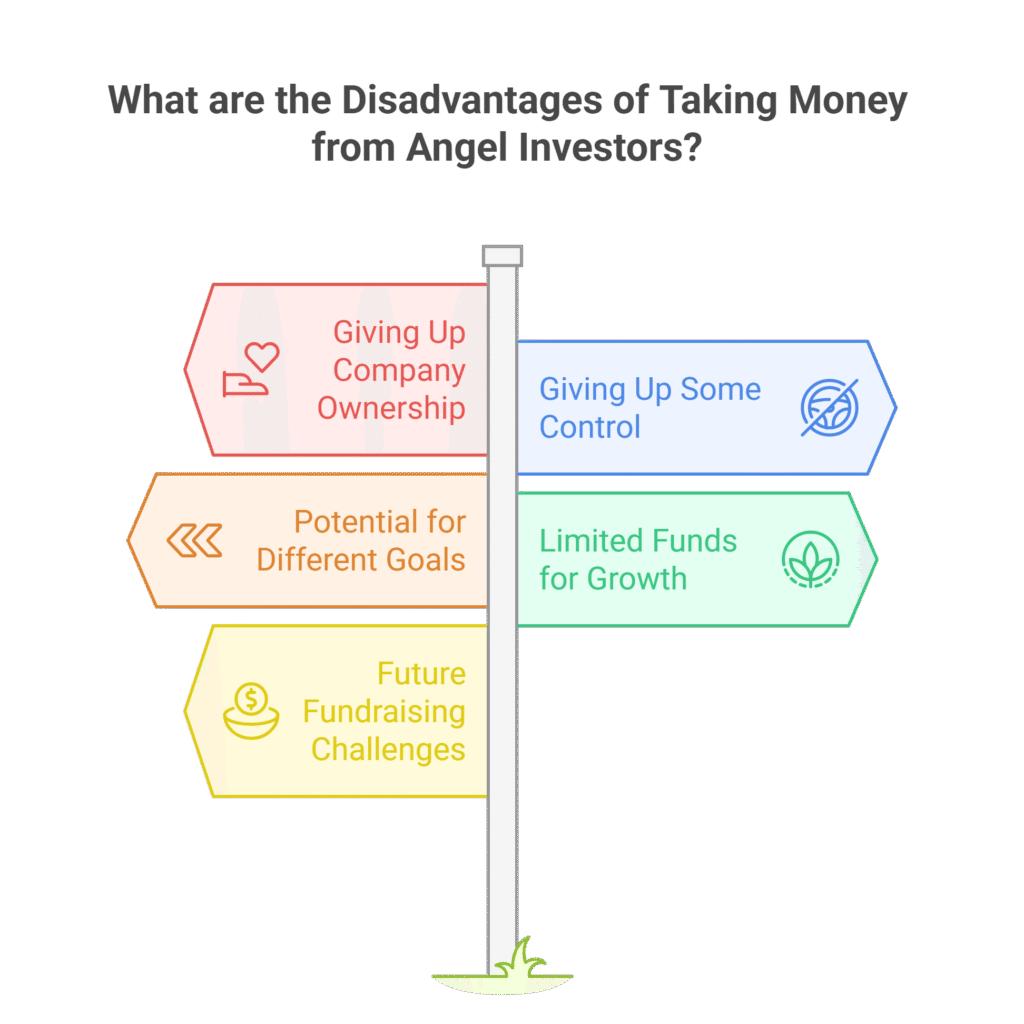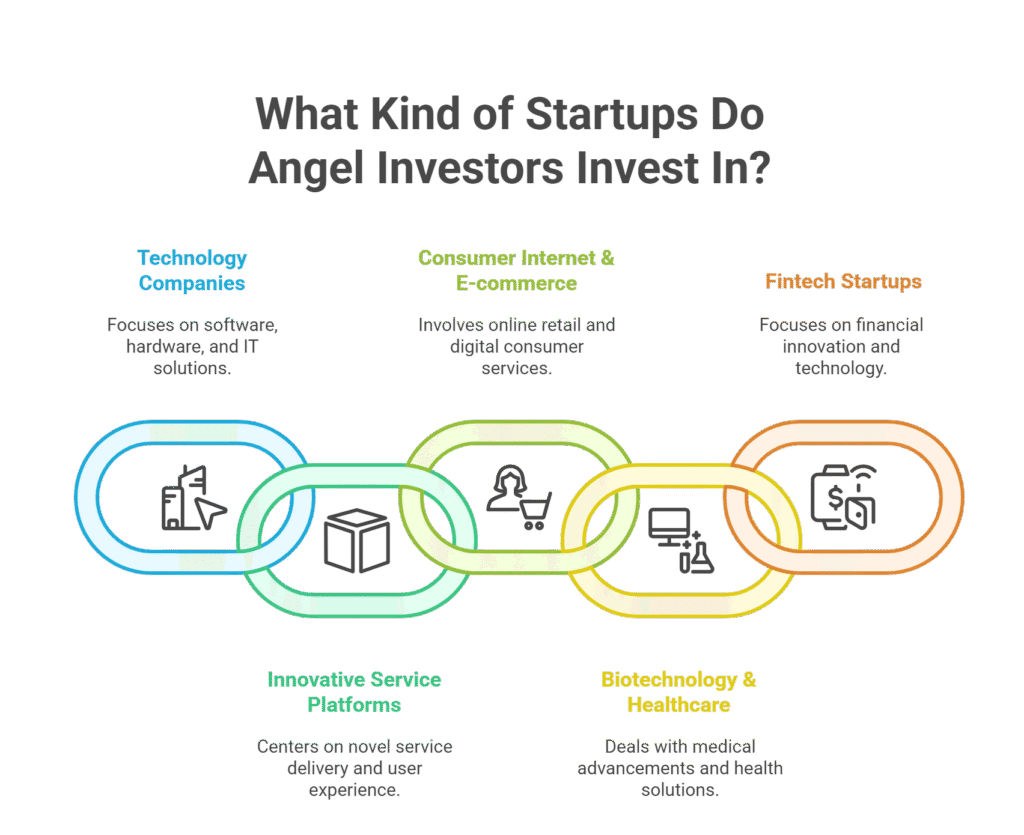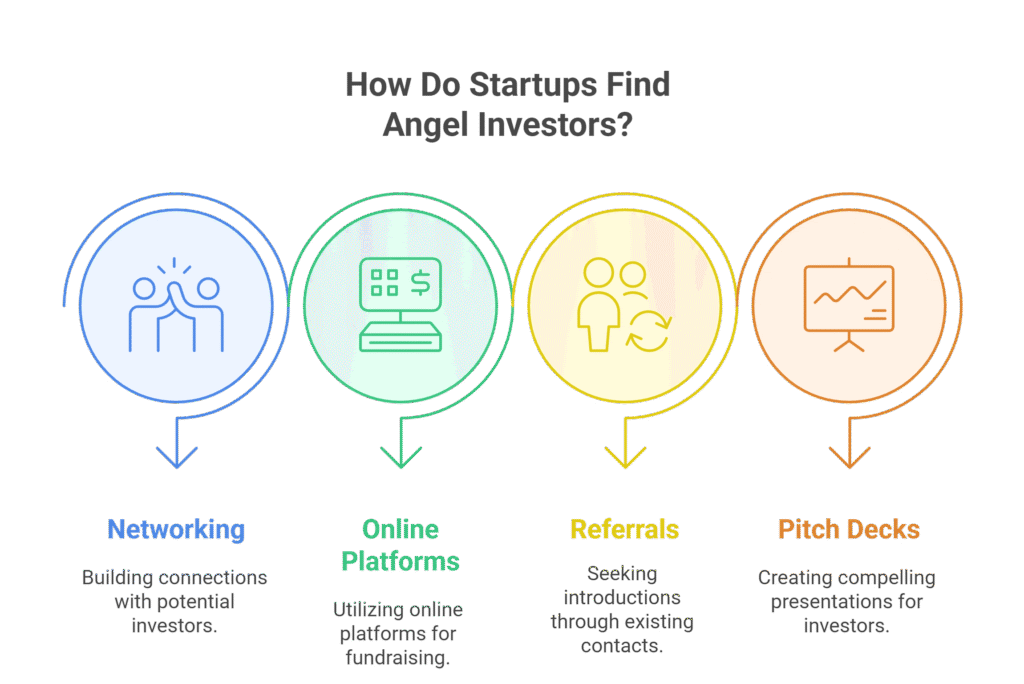Got a brilliant idea for a new business, but the money in your bank account doesn’t quite match your vision? Or maybe you’ve heard about exciting new companies getting early funding and wondered how it all works?
This blog post is here to shed light on a key group of people who often step in at this crucial stage: angel investors. We’ll explain who these individuals are and why their support is so important for startups.
By the end of this post, you’ll understand exactly what angel investors are, the different types of angel investors, and the kind of startups they typically look for. We’ll also cover how startups go about finding these angels, what investors consider before putting in their money, and the step-by-step process of angel investment.
Before we explore how angel investors work with startups, let’s first understand who they are and what role they play in the startup world.
What Exactly Are Angel Investors?
Angel investors are individuals who put their own money into early-stage companies, often startups. Think of them as people with extra funds who believe in a new business idea and are willing to invest their personal wealth to help it grow.
These individuals are not investing on behalf of a large company or a fund. It’s their own money at stake. Often, these angel investors have been successful in business themselves, giving them valuable experience and insights.
For example, Anupam Mittal, the founder of Shaadi.com and a familiar face from Shark Tank India. He’s a prime example of an angel investor. Having built and sold successful businesses, he now uses his personal wealth to invest in numerous early-stage Indian startups, such as Ola and BigBasket.
He not only provides the capital but also offers his extensive business experience and network to help these young companies grow.
Why Do Angel Investors Invest in a Startup?
There are several reasons why these individuals choose to become angel investors:
1. Financial Returns
Like any investor, angel investors hope to see their money grow. If the startup they invest in becomes successful, the value of their investment can increase significantly, leading to a good financial return. They are taking a risk, but the potential reward can be high.
2. Supporting Innovation
Many angel investors are passionate about new ideas and technologies. They want to help bring innovative products and services to the market. By investing in startups, they play a role in supporting creativity and progress. They might be excited by the potential of a new technology or a different way of solving a problem.
3. Personal Interest
Some angel investors are interested in specific industries or types of businesses. They might have expertise in a certain area and want to support new ventures in that field. Others might simply enjoy the process of helping new businesses get off the ground and seeing them succeed. They might also want to stay connected to the cutting edge of innovation.
What are the Key Characteristics of Angel Investors?
The following are some key characteristics of angel investors.
1. Invest Their Own Money
This is a key feature that sets angel investors apart from venture capitalists (VCs). VCs manage money pooled from various institutions and wealthy individuals. Angel investors are using their own personal funds, which means they have a direct and personal stake in the success of the companies they invest in.
2. Often Provide Mentorship and Advice
Since many angel investors have a background in business, they often offer more than just money. They can provide valuable guidance, share their experiences, and offer advice to the startup founders.
This mentorship can be incredibly helpful in overcoming the challenges of building a new company. They can offer insights into strategy, operations, and networking.
3. Typically Invest in Early-Stage Companies
Angel investors usually come in at the very beginning of a startup’s life, often before the company has significant revenue or a fully developed product. This early-stage funding is crucial for helping these young companies get off the ground, develop their product, and start reaching customers.
They are willing to take on the higher risk associated with these very early ventures in the hope of significant future returns.
Now that you know what angel investors are, it’s helpful to know that not all of them are the same. Let’s look at the different types you might come across.
Also Read: What is the Difference in a Startup and a Small Business?
What are the Different Types of Angel Investors?
Angel investors aren’t all the same. They can be grouped in a few different ways based on how they work and what their backgrounds are:
Based on How They Work Together
- Individual Angels: These are people who invest their own money directly into startups. They often have a lot of business know-how and might give advice to the companies they invest in. They can usually make their own investment decisions quickly.
- Angel Groups (or Networks): These are organized groups where several angel investors pool their money to invest in startups together. By working as a group, they can often invest larger amounts and share the work of checking out potential investments.
- Angel Syndicates: In this setup, one experienced angel investor takes the lead in finding a startup, deciding on the investment terms, and managing the investment. Then, other investors can choose to put their money in alongside this lead investor. This lets less experienced angels learn from those with more experience.
Based on Their Background and What They Care About
- Serial Entrepreneurs: These are people who have started and sold their own successful businesses. Now, they invest in new startups and can offer a lot of practical advice based on what they’ve learned.
- Corporate Angels: These are usually people who have worked at a high level in a specific industry. They invest in startups in that same area and can provide useful connections and guidance.
- Financial Angels: For these investors, the main goal is to make money from their investments. They might not be as involved in giving advice or running the business.
- Strategic Angels: These investors invest with a specific plan in mind, often looking for ways their existing businesses or interests can connect with the startup.
- Impact Angels: These investors care about more than just money. They want to invest in startups that also have a positive impact on society or the environment.
- Local Angels: These investors focus on startups in their own city or region because they want to support the businesses in their community.
- Super Angels: These are angel investors who are very experienced and invest in startups regularly. They often act a bit like small venture capital funds, being good at finding promising startups early on and often leading investment rounds.
Knowing about these different types of angel investors can help startups think about who might be the best fit for them in terms of money, advice, and connections.
Understanding the types is important, but it’s equally useful to weigh the pros and cons of bringing an angel investor into your startup journey.
You May Also Like: 6 Zero-Budget Side Hustles in India You Can Start With a Full Time Job
Advantages and Disadvantages of Angel Investors
Getting money from angel investors can be a game-changer for a startup. They offer more than just cash, which can be a huge help in the early days. However, it’s also important to know that taking money from outside investors comes with its own set of challenges.
This section will look at both the good and bad sides of angel investment so you can make an informed decision for your own business.
What are the Advantages of Taking Money From Angel Investors?
When a startup successfully secures funding from angel investors, it can bring several significant advantages beyond just the money itself:

1. Funding
One of the most obvious and immediate benefits is that the startup gains access to important early-stage capital. For many young companies, especially those that are pre-revenue or still developing their product, getting this initial funding can be the key to survival and growth.
This money can be used for a variety of essential purposes. That includes hiring key team members, developing the initial version of their product or service, conducting market research, and starting early marketing efforts.
Without this early financial support, many promising startups would struggle to get off the ground or reach critical milestones. Angel investment can provide the financial fuel needed to turn an idea into a tangible business.
2. Mentorship and Guidance
Many angel investors are not just providing money, they also bring a wealth of experience and knowledge from their own successful business careers. They have often faced similar challenges and learned valuable lessons along the way.
This experience can be incredibly beneficial for startup founders, who may be struggling from the complexities of building a company for the first time. Angel investors can offer guidance on strategic decisions, operational challenges, and avoiding common pitfalls.
This mentorship can save startups time and money by helping them make smarter choices and avoid costly mistakes. Having someone with a proven track record in your corner can be a significant asset.
3. Networking Opportunities
Angel investors often have a wide network of contacts in the business world, including other investors, industry experts, potential partners, and even future customers. When a startup brings an angel investor on board, they can often tap into this network.
The investor might be able to introduce the startup founders to other individuals or organizations that could be valuable for their growth. That includes follow-on investors who might participate in later funding rounds and strategic partners who can help with distribution or technology.
It also includes key players in their industry who can offer insights or opportunities. These connections can significantly accelerate a startup’s progress and open doors that might otherwise remain closed.
4. Validation
When an experienced angel investor decides to invest in a startup, it can act as a form of validation for the business idea and the team. It signals to others that someone with business acumen and financial resources believes in the company’s potential. This vote of confidence can make it easier for the startup to attract further investment from other angels or even venture capitalists in later funding rounds.
Investors often look at who else has already put money into a company as a form of due diligence. Having a respected angel investor on board can increase the credibility of the startup and make it more appealing to other potential investors.
What are the Disadvantages of Taking Money from Angel Investors?
While angel investors can provide crucial funding and support for a startup, it’s also important for founders to understand that taking their money can come with certain drawbacks. It’s not always a perfect solution, and there are trade-offs to consider.

1. Giving Up Company Ownership
When an angel investor puts money into your startup, they usually get a share of your company in return. This means you, as the founder, own a smaller percentage of your business. This reduction in your ownership stake can be significant, especially over multiple rounds of funding.
2. Giving Up Some Control
Along with ownership, angel investors might also want a say in how your company is run. They might ask for a seat on your board of directors or have certain approval rights over big decisions. This means you might lose some direct control over your business and have to get their agreement on important matters.
3. Potential for Different Goals
Sometimes, an angel investor’s ideas for the company’s future might not fully match yours. They might want the business to grow in a certain direction or seek a quick return on their investment, which could go against your long-term vision. This can lead to disagreements and make decision-making harder.
4. Limited Funds for Growth
Angel investors typically provide smaller amounts of money compared to larger investment firms. While this initial capital is helpful, it might not be enough to fund your startup’s long-term growth or future expansion plans. You might find yourself needing to raise money again sooner than expected.
5. Future Fundraising Challenges
Sometimes, the terms you agree to with an early angel investor can make it harder to get money from bigger investors (like venture capitalists) later on. If the terms are not favorable, it might make your company look less attractive for future, larger funding rounds.
Once you’re aware of the benefits and challenges, the next question is: what kind of startups actually catch an angel investor’s attention?
Also Read: 6 Side Hustles for Students That Actually Work in 2025
What Kind of Startups Do Angel Investors Invest In?
Angel investors often look for startups that fall into certain categories, especially those that show a strong potential for growth and can change how things are done. They tend to be drawn to businesses that aren’t just local shops, but ideas that can get very big.

1. Technology Companies
Angel investors are very interested in startups that create new software, hardware, or digital solutions. These companies often have the ability to reach many users without increasing their costs too much. This includes businesses building new apps, specialized software for industries, or advanced tech devices.
- Example: Ather Energy, an Indian electric vehicle company that designs and manufactures smart electric scooters, received early seed funding from angel investors like Sachin Bansal (co-founder of Flipkart). This helped them innovate in the EV market.
2. Innovative Service Platforms
These are startups that use technology to offer services in new or better ways, connecting people or solving problems through a platform. They take traditional services and make them more convenient, accessible, or affordable through a digital approach. Their business model allows them to grow quickly by adding more users to their platform.
- Example: Practo is an online platform connecting patients with doctors for appointments and consultations. It received early investment from various angel investors who saw the potential in digitizing healthcare services in India.
3. Consumer Internet & E-commerce Startups
Angel investors frequently look at companies that build online businesses directly serving consumers. This includes new e-commerce stores that sell unique products, subscription services delivered online, or digital marketplaces that connect buyers and sellers of specific goods. These businesses can often reach a large customer base through the Internet.
- Example: Companies like BigBasket (online grocery delivery) and Flipkart (e-commerce) initially received crucial early support from angel investors. These included prominent individuals who believed in the future of online consumer services in India, even before the companies raised large VC rounds.
4. Biotechnology & Healthcare Technology Startups
These startups are focused on creating new medical solutions, drugs, and devices, or using technology to improve healthcare services. Angel investors with backgrounds in science or medicine are often drawn to these areas, seeing the potential for significant impact and financial returns if a breakthrough occurs.
- Example: HealthifyMe, a health and fitness platform offering calorie tracking and coaching, was initially incubated by Microsoft Accelerator. It has also received support from various angel investors recognizing its potential in the digital health space.
5. Fintech (Financial Technology) Startups
Fintech startups use new technology to improve or automate financial services. This could involve new ways to pay, manage money, lend, or invest. Angel investors are interested because these companies can make financial processes more efficient and accessible, often serving large customer bases.
- Example: Razorpay, a popular online payment gateway for businesses in India, received early angel investment from individuals like Kunal Bahl and Rohit Bansal (Snapdeal founders). That helped Razorpay build its innovative financial technology platform.
Angel investors are generally attracted to these types of companies because they show strong signs of being able to grow fast and have a big impact. It is what these investors hope for when they put their own money into a new business.
If your startup fits the criteria, the next step is figuring out how to connect with angel investors. Let’s look at where and how founders usually find them.
How Do Startups Find Angel Investors?
Finding the right angel investor can be a crucial step for a young startup needing early funding. Here are some common ways startups connect with these individuals:

1. Networking
Getting out and meeting people in the business world is a key way for startups to find angel investors. This involves going to industry events where people in similar fields gather and attending pitch competitions where startups present their ideas to potential investors. It also means connecting with other entrepreneurs who may have already raised angel funding.
By actively participating in these circles, founders can increase their visibility and make direct connections with individuals who might be interested in investing. These events also provide opportunities to learn about the investment process and hear from investors themselves.
Example: Founders often attend major events like TiEcon Delhi-NCR, Global Startup Summit, or The August Fest in Hyderabad. At these events, they can meet various angel investors, participate in pitch competitions like those hosted by Innopreneurs or the Supernova Challenge, and network with other successful founders who might introduce them to their angel investor contacts.
2. Online Platforms
There are also online platforms and networks that help connect startups with angel investors. These platforms allow startups to create profiles and share information about their business and funding needs. Investors can then browse these profiles and reach out to startups that catch their eye.
These online tools can broaden a startup’s reach beyond its immediate geographic area and provide access to a larger pool of potential investors. However, it’s important for startups to present themselves professionally and have their information well-prepared on these platforms.
Example: Platforms like LetsVenture and AngelList India are prominent online hubs where Indian startups can create detailed profiles, showcase their pitch decks, and state their funding requirements. Angel investors registered on these platforms can review these pitches and connect directly with founders.
3. Referrals
One of the most effective ways to get in touch with angel investors is through introductions from people you already know and trust. This could include advisors who are helping your startup or mentors who are guiding you. It might also be other investors who have already supported your company or know angel investors in their network.
A warm introduction from a mutual connection can carry a lot of weight and increase the chances of an angel investor taking your pitch seriously. Building strong relationships with people in the startup ecosystem can open doors to these valuable referrals.
4. Pitch Decks and Business Plans
Before reaching out to any potential investor, whether through networking, online platforms, or referrals, startups need to have compelling materials ready to present their business. A pitch deck is a brief presentation that summarizes the key aspects of the startup, such as the problem it solves, the solution it offers, the market opportunity, the team, and the financial projections.
A detailed business plan provides a more in-depth look at the company’s strategy and operations. These materials are essential for clearly communicating the startup’s vision and potential to investors and convincing them to learn more. A well-crafted pitch deck and business plan show professionalism and preparedness.
If you are willing to go deeper into how to find angel investores in India, then read this full blog.
Finding an investor is one thing, but convincing them to invest is another. Here’s what angel investors typically look for before saying yes.
You May Also Like: Review of The $100 Startup
What Do Angel Investors Look For in a Startup?
When angel investors are considering putting their money into a young company, they carefully evaluate several key aspects to determine if it’s a worthwhile investment. Here are some of the main things they pay close attention to:

1. The Idea/Problem
First and foremost, angel investors want to understand what problem the startup is trying to solve. They want to know if it’s a real problem that a significant number of people or businesses experience. If the problem isn’t significant or if not many people care about it, the startup is less likely to succeed.
Additionally, they want to see if there’s a market for the proposed solution. Even if the problem is real, if there aren’t enough potential customers willing to pay for the solution, the startup’s chances of growth are limited. Investors need to believe that the idea is not just interesting but also addresses a genuine need in a way that people will value.
2. The Team
Angel investors often say that they invest in the team just as much as the idea. They want to see if the founders and the early team members have the right skills, experience, and dedication to make the business successful.
Do the founders have a background that is relevant to the problem they are trying to solve? Are they passionate about their idea and committed to working hard to make it a reality?
Investors look for a team that is not only skilled but also adaptable, able to learn, and willing to overcome the inevitable challenges of building a startup. They need to trust that the team can take the initial idea and turn it into a successful business.
3. The Market
The size and potential of the market that the startup is targeting are also crucial factors for angel investors. They want to know if there are enough potential customers to allow the startup to grow to a significant size. A large and growing market offers more opportunities for the startup to expand its customer base and increase its revenue over time.
Investors will look at market research and analysis to understand the potential scale of the opportunity. They want to invest in startups that can capture a meaningful share of a substantial market.
4. The Business Model
Angel investors need to understand how the startup plans to make money. The business model outlines the way the company will create, deliver, and capture value. Is there a clear and realistic plan for generating revenue and eventually becoming profitable?
Investors will want to see how the startup will attract customers, what they will charge, and how they will manage their costs. A well-thought-out and sustainable business model is essential for long-term success and for providing a return on the investor’s investment.
5. Valuation and Potential Return
Angel investors will carefully consider the startup’s current valuation (how much the company is worth) and the potential for a good return on their investment in the future. They need to believe that the company’s current value is reasonable given its stage of development and market potential.
They will also consider how their investment might grow over time. For example, this could happen if the company raises more funding at a higher valuation or gets acquired by a larger company. Investors are looking for a significant multiple on their initial investment within a reasonable timeframe to make the high risk of early-stage investing worthwhile.
Now that you know what they expect, let’s walk through how the actual angel investment process usually works—from the first pitch to the final deal.
What is the Process of Angel Investment?
When a startup and an angel investor decide to work together, they typically go through a series of steps to finalize the investment. Here’s a breakdown of what that process usually looks like:

1. Initial Contact and Pitch
This is where the startup first gets in touch with a potential angel investor. This might happen through networking events, online platforms, or a referral. The startup will then present its idea and business plan to the investor, often through a pitch deck.
The goal of this initial pitch is to get the investor interested enough to learn more. The startup needs to clearly and concisely explain what their business does, the problem they are solving, and why it has the potential to be successful. If the angel investor sees potential, they will move to the next stage.
2. Due Diligence
If the angel investor is interested after the initial pitch, they will usually conduct due diligence. This is like an investigation where the investor takes a closer look at the startup to verify the information provided and assess the risks and opportunities.
They might review the business plan in detail, examine the financials, research the market, talk to potential customers, and evaluate the team. The investor wants to make sure that the startup is legitimate and that its claims are accurate.
They also want to know it has a realistic chance of success before committing their money. This process can take some time as the investor gathers and analyzes information.
3. Term Sheet Negotiation
If the due diligence goes well and the angel investor decides they want to invest, the next step is to negotiate the terms of the investment. These terms are usually outlined in a document called a term sheet.
This document will cover important aspects like
- how much money the investor will put in
- what percentage of the company they will own (equity)
- the valuation of the company
- any specific rights or conditions that the investor might have
The founders and the investor will discuss and agree on these terms, which will form the basis of the final investment agreement. This stage involves legal and financial considerations and aims to create a mutually acceptable agreement.
4. Investment and Closing
Once the term sheet is agreed upon, the legal documents for the investment are prepared and signed. This is the “closing” of the deal. The angel investor will then transfer the agreed-upon funds to the startup.
In return, the startup will issue shares or other forms of equity to the investor, giving them ownership in the company. This marks the formal completion of the investment process, and the startup now has the capital to fuel its growth plans.
5. Ongoing Involvement
After the investment is made, the angel investor’s involvement with the startup often continues. Many angel investors, especially those with business experience, provide ongoing mentorship and advice to the founders.
They might offer guidance on strategy, help with networking and connections, and share their insights based on their own past experiences. This ongoing support can be very valuable to the startup as it deals with the challenges of growth and development. The level of involvement can vary depending on the investor and the needs of the startup.
Conclusion
Angel investors play a vital role in startups. They provide crucial early funding that helps new and innovative companies get started and grow. Beyond just money, they often bring valuable experience, mentorship, and connections that can significantly increase a startup’s chances of success. For founders, understanding how angel investors think and what they look for is key to securing this important early support.
For anyone interested in the startup world, whether as a future founder or simply someone wanting to learn more, knowing about angel investors is essential. They are a key part of how new ideas get the resources they need to become successful businesses.
If you have a dream of building something new, remember that there are people out there willing to believe in your vision and help you take those first important steps.
Want to learn even more about how startups get funding and other essential topics for new businesses? Head over to Startup Words! You’ll find easy-to-understand guides and resources, including a glossary and helpful articles for startups. Visit Startup Words today to expand your knowledge and get the information you need for your entrepreneurial journey.
